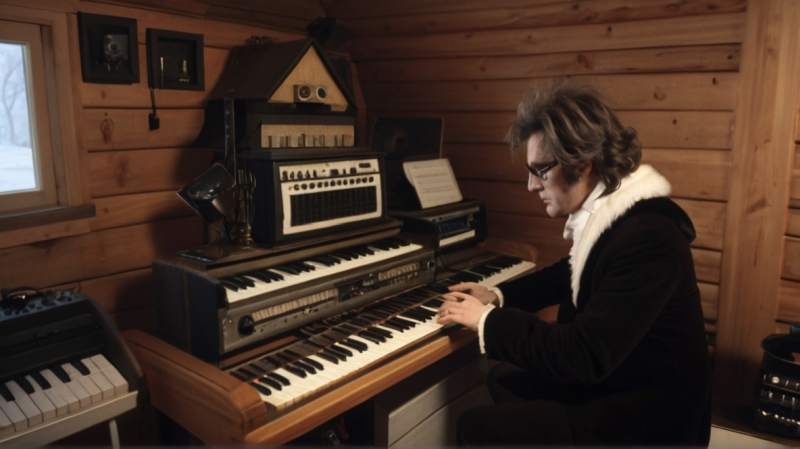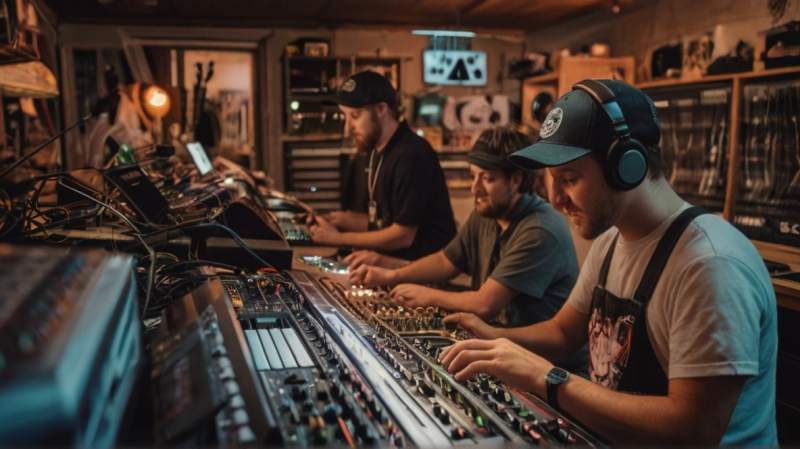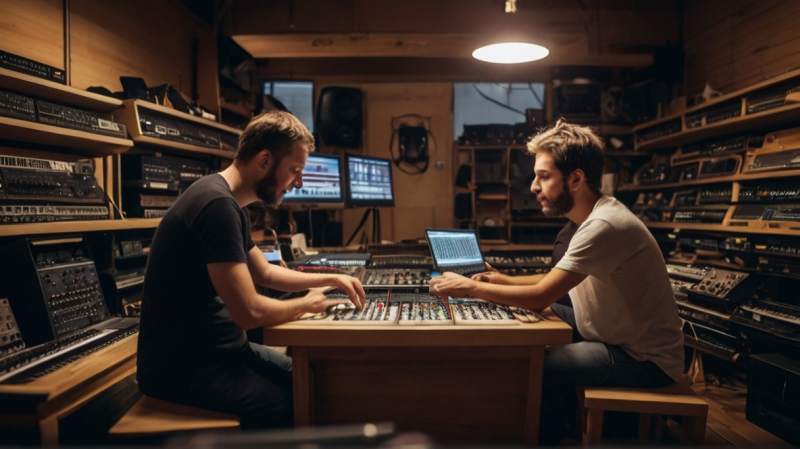Music marketing is the process of promoting a musician, band, or music product. It involves a variety of activities, such as:
- Creating a strong brand identity
- Developing a marketing plan
- Executing marketing campaigns
- Measuring and evaluating results
The goal of Music marketing is to increase awareness of a musician or band and their music, and to generate interest in their work. This can lead to increased sales of music, tickets, and merchandise, as well as opportunities for live performances and other promotional activities.
The importance of Music marketing
Music marketing is essential for the success of any musician or band. In today's competitive music industry, it is more important than ever to stand out from the crowd and get your music heard.
Music marketing can help you:
- Reach a wider audience
- Build a strong fan base
- Generate buzz about your music
- Get your music played on radio and other media
- Book live performances
Types of music marketing
There are many different types of
Music marketing that can be used to promote a musician or band. Some common types of
Music marketing include:

Social media marketing
Social media is a powerful tool for Music marketing . It can be used to connect with fans, promote your music, and build buzz about your career. Social media platforms like Facebook, Twitter, Instagram, and TikTok can be used to share your music, videos, and news with fans. You can also use social media to engage with fans, answer their questions, and build relationships.
Online advertising
Online advertising can be a great way to reach a wider audience for your music. You can use online ads to target specific demographics, interests, and locations. There are many different types of online advertising available, including search engine marketing (SEM), display advertising, and social media advertising.

Public relations
Public relations (PR) can help you generate positive publicity for your music. PR can be used to get your music featured in the media, get you interviews, and build buzz about your career. You can work with a PR agency or do your own PR.
Live performance
Live performances are a great way to connect with fans and build a following. When you perform live, you have the opportunity to showcase your music and talent in person. Live performances can also help you generate buzz about your music and build a fan base.
Touring
Touring is a great way to reach a wider audience for your music. When you tour, you can perform in different cities and towns, reaching fans who may not have heard of you otherwise. Touring can also help you build a strong fan base and generate buzz about your music.
Conclusion
Music marketing is a complex and ever-changing field. There are many different strategies and tactics that can be used to promote a musician or band. The best way to develop a successful music marketing strategy is to understand your target audience, your goals, and your budget.
Here are some tips for developing a successful music marketing strategy:
Start by defining your target audience. Who are you trying to reach with your music? Once you know your target audience, you can tailor your
Music marketing messages and strategies to appeal to them.

Set clear goals for your
Music marketing efforts. What do you want to achieve with your marketing? Do you want to increase awareness of your music, build a fan base, or generate sales? Once you know your goals, you can develop strategies to achieve them.
Create a budget for your
Music marketing efforts. Marketing can be expensive, so it's important to create a budget and stick to it.
Track your results and make adjustments as needed. It's important to track the results of your marketing efforts so you can see what's working and what's not. This will help you make adjustments to your strategy as needed.
By following these tips, you can develop a successful music marketing strategy that will help you reach your goals and achieve success in the music industry.
The shift from physical to digital music distribution
The music industry has undergone a major transformation in recent years, with the rise of digital distribution. In the past, music was primarily distributed on physical formats, such as vinyl records, cassette tapes, and CDs. However, the advent of the internet and streaming services has led to a rapid decline in physical music sales.
There are a number of factors that have contributed to the shift to digital music distribution. First, digital music is more convenient and accessible than physical music. It can be downloaded or streamed instantly, and it can be played on a variety of devices. Second, digital music is often cheaper than physical music. Streaming services offer unlimited access to music for a monthly subscription fee, which can be a much more affordable option than buying individual albums or songs.
The shift to digital music distribution has had a significant impact on the music industry. It has led to the decline of traditional record labels, as well as the rise of new digital music distributors. It has also changed the way that music is consumed, as people are now more likely to listen to music on-demand rather than purchasing albums or songs outright.
The decline of physical music sales
The decline of physical music sales has been dramatic. In 2005, physical music accounted for 90% of the global music market. By 2022, that figure had fallen to just 30%.
The decline of physical music sales can be seen in the following statistics:
- In 2005, the global sales of vinyl records were 250 million units. By 2022, that figure had fallen to just 10 million units.
- In 2005, the global sales of cassette tapes were 100 million units. By 2022, that figure had fallen to just 1 million units.
- In 2005, the global sales of CDs were 2.6 billion units. By 2022, that figure had fallen to just 1 billion units.
The decline of physical music sales has been driven by a number of factors, including the rise of digital music distribution, the increasing popularity of streaming services, and the changing habits of music consumers.
The rise of digital music distribution
The rise of digital music distribution has been a major factor in the decline of physical music sales. Digital music is more convenient and accessible than physical music, and it is often cheaper.
Digital music distribution can be divided into two main categories:
- Downloads: Digital music can be downloaded to a computer or device.
- Streaming: Digital music can be streamed over the internet.
Downloads were the dominant form of digital music distribution in the early years. However, streaming has become increasingly popular in recent years.
Streaming services
Streaming services offer unlimited access to music for a monthly subscription fee. This makes streaming a much more affordable option than buying individual albums or songs.
The most popular streaming services include Spotify, Apple Music, and Amazon Music.
The changing habits of music consumers
The habits of music consumers have also changed in recent years. People are now more likely to listen to music on-demand rather than purchasing albums or songs outright.
Streaming services make it easy for people to find and listen to the music they want, when they want. This has led to a decline in the demand for physical music.
The future of music distribution
The shift to digital music distribution is likely to continue in the future. Streaming services are becoming increasingly popular, and they are likely to continue to erode the market for physical music.
However, there may be some resurgence in the popularity of physical music in the future. Some people prefer the physical experience of owning a vinyl record or CD, and they may be willing to pay a premium for it.
The Importance of Social Media in Music Distribution
Social media has become an essential tool for music distribution in recent years. It allows artists to connect with fans, promote their music, and build a following.
Connecting with Fans
Social media is a great way for artists to connect with fans on a personal level. They can share behind-the-scenes content, interact with fans in the comments, and answer questions. This helps to build relationships with fans and create a sense of community.
Promoting Music
Social media is also a powerful tool for promoting music. Artists can use it to share new releases, announce tour dates, and collaborate with other artists. They can also use it to target specific demographics with their marketing campaigns.
Building a Following
Social media can help artists to build a following and reach new audiences. By sharing interesting and engaging content, artists can attract new fans and grow their following.
How to Use Social Media for Music Distribution
There are a few things that artists can do to use social media effectively for music distribution:
Create a consistent presence: Artists should post regularly on social media to keep their fans engaged. They should also use a consistent tone and style across all of their channels.
Use relevant hashtags: Hashtags are a great way to get your music seen by more people. Artists should use relevant hashtags when they post about their music.
Collaborate with other artists: Collaborating with other artists is a great way to reach a new audience. Artists can collaborate on songs, videos, or even just share each other's content on social media.
Conclusion
Social media is a powerful tool that can help artists to connect with fans, promote their music, and build a following. By using social media effectively, artists can reach new audiences and achieve their music distribution goals.
All about music production
In addition to the main topics that can be selected as a menu item above, here is a list of interesting articles on the subject of music production:
- How to build D.I.Y. Microphone Absorber?
- Indiepop, Elektropop & Electronica
- Mixing console - analog or digital?
- Songwriting with synthesizer and DAW
- Vermona Vintage Gear (GDR)
- What is self-publishing?
- What is synthesizer programming?
- What is M/S Stereo in mixing process?
- What is phase cancellation in mixing process?
How to Get Known as a Newcomer on the Internet
The internet is a powerful tool that can help you to get known as a newcomer. With careful planning and execution, you can use the internet to reach a large audience and build a following for your music.
Here are a few tips on how to get known as a newcomer on the internet:
**1. ** Create a strong online presence. This includes having a website, social media accounts, and a YouTube channel. Your online presence should be professional and well-maintained.
**2. ** Produce high-quality content. This includes your music, videos, and other online content. Your content should be well-produced and engaging.
**3. ** Promote your content. Share your content on social media, submit it to blogs and websites, and reach out to music journalists and industry professionals.
**4. ** Get involved in the music community. Connect with other musicians, attend shows, and participate in online forums and discussions.
**5. ** Be patient. It takes time to build a following on the internet. Don't expect to become an overnight success.
Here are some specific tips for each of these areas:
- Website
Your website should be easy to navigate and informative. It should include your music, contact information, and other relevant information.
Make sure your website is mobile-friendly. More and more people are using their phones and tablets to access the internet.
Use high-quality images and videos. Visual content is a great way to capture attention and engage your audience.
- Social media
Be consistent with your social media posts. Post new content regularly to keep your audience engaged.
Interact with your followers. Respond to comments and questions, and participate in conversations.
Use relevant hashtags. Hashtags can help people find your content.
- YouTube
Create high-quality videos that are relevant to your music. You can post music videos, live performances, behind-the-scenes footage, and more.
Be consistent with your YouTube uploads. Post new videos regularly to keep your audience engaged.
Interact with your viewers. Respond to comments and questions, and encourage people to subscribe to your channel.
- Content
Make sure your music is well-produced and original. Your music should be something that people will want to listen to.
Create videos that are visually appealing and engaging. Your videos should be something that people will want to watch.
Write interesting and informative blog posts. Your blog posts should be something that people will want to read.
- Promoting your content
Share your content on social media. This is a great way to reach a large audience.
Submit your content to blogs and websites. This can help you to get exposure to new people.
Reach out to music journalists and industry professionals. They can help you to get your music heard by a wider audience.
- Getting involved in the music community
Connect with other musicians. They can be a great source of support and advice.
Attend shows. This is a great way to meet new people and get your music heard.
Participate in online forums and discussions. This is a great way to connect with other musicians and fans.
- Being patient
It takes time to build a following on the internet. Don't expect to become an overnight success.
Keep working hard and creating great content. Eventually, your hard work will pay off.
By following these tips, you can increase your chances of getting known as a newcomer on the internet.
